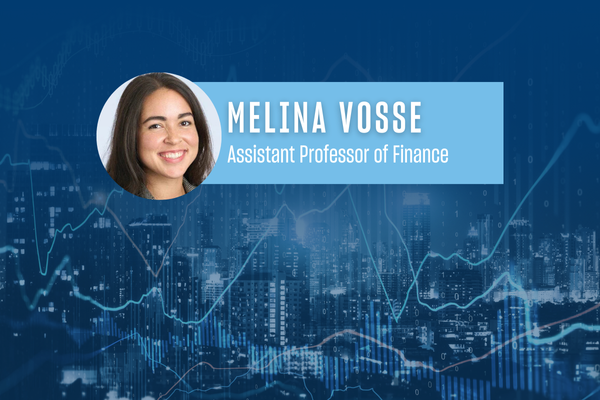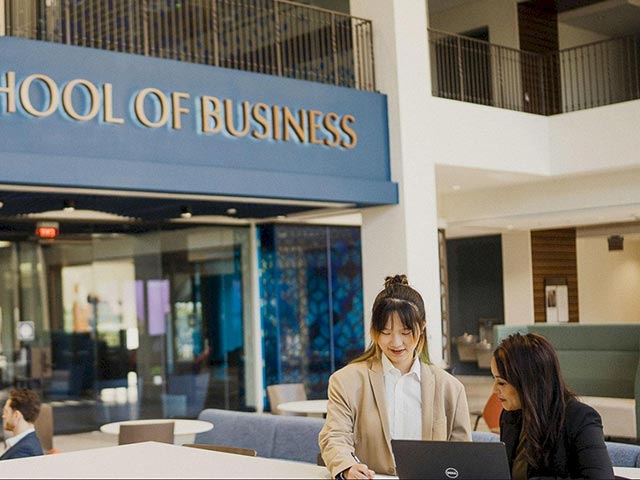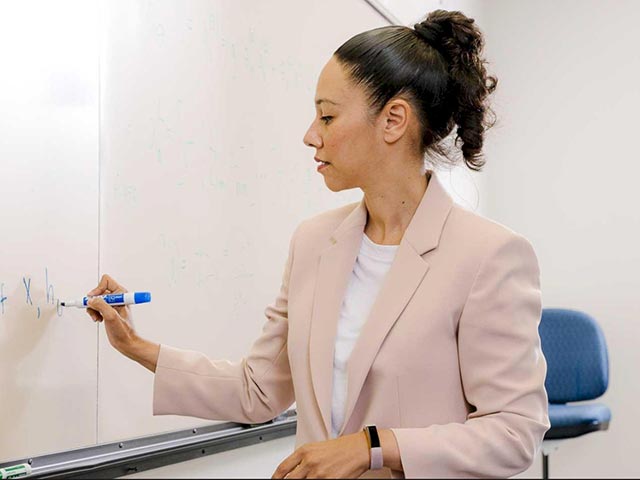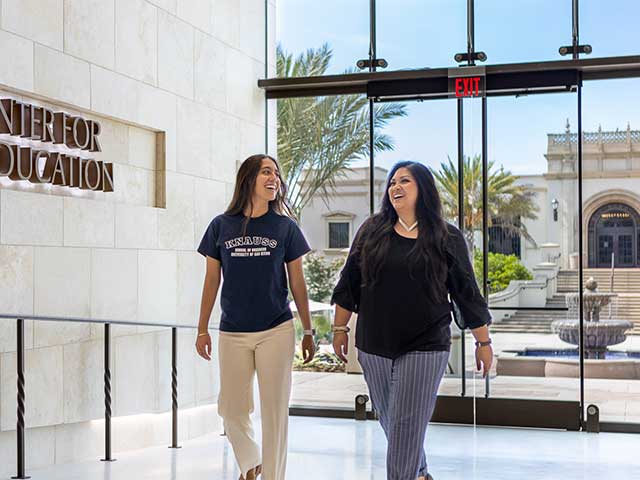Women in Finance: Navigating and Thriving in a Male-Dominated Industry With Dr. Melina Vosse

Breaking into finance can be challenging, especially for women who are striving to carve out a path in a traditionally male-dominated industry. Melina Vosse, PhD, assistant professor of finance at the University of San Diego, has walked this path herself. In this webinar hosted in partnership with Graduate Admissions at the Knauss School of Business, she discusses how she found success navigating through the field of finance and the skills and insights that have helped her excel in her career.
Read on to hear her invaluable insights into overcoming obstacles, building confidence and succeeding in finance, or watch the full webinar below:
Interested in strengthening your expertise in finance? Discover USD’s Master of Science in Finance program.
Insights From a Finance Leader With Dr. Melina Vosse
Despite her success, Dr. Melina Vosse's journey in finance was filled with challenges, from battling imposter syndrome to navigating exclusionary networking environments. In her interview, Dr. Vosse shares how mentorship, persistence and strategic networking helped her build confidence and excel in the field. She offers valuable insights for women looking to break into finance, emphasizing the importance of resilience, curiosity and self-advocacy. The following interview has been edited for brevity.

Q: Could you tell us a little bit about your background and what led you to pursue a career in finance?
Dr. Vosse: My journey into finance wasn’t intentional. I originally pursued a medical path but shifted to finance when I realized I loved problem-solving and understanding how financial systems worked. I found research on financial decision-making fascinating, which solidified my choice.
I grew up in a small town in Ohio, your typical middle-class family. My dad worked at a software company, my mom was a stay-at-home mom, and just really kind of classic American upbringing, no exposure to the big-city finance world. I didn't even think about going into finance when I was growing up.
I remember my first finance class, it was such a foreign environment. I felt so out of place, all these words and terminologies that I had not experienced before. It was just a totally new world. But after I got more comfortable and learned about what finance actually was, I became really interested in it.
And then as I kind of grew in my understanding of finance, I got involved in research. I reached out to one of the people leading the financial decision-making and consumer decision-making research, and by a little bit of chance, dipped my toe in the research. I then decided to shift away from the med school path and found out that finance was the topic that was more fulfilling to me.
Q: So when you were first starting out, what were some of the biggest challenges that you faced?
Dr. Vosse: Just getting comfortable with finance as a language. In early classes, I felt lost for a very long time with the professors speaking in financial terminology. I didn’t know what equities were and leverage and capital markets and all of these things. I wasn't able to ask meaningful questions back then and it was a very long game of catch-up.
But eventually, I got a little bit more comfortable, and even in the beginning of the PhD program, I still felt like more new ideas and terminology and topics were coming up and just constantly feeling like there's so much that I didn't know. So I think that really fed into my imposter syndrome. Talking to a lot of other women in finance and in other fields, it's quite common. Imposter syndrome, the feeling like you don’t belong and your ideas aren’t valid, and what you’re asking or your opinions aren’t meaningful, or maybe you’re stupid or something. So a lot of imposter syndrome early on, I think that was the biggest underlying challenge that I faced.
I'm also quite shy, so it's like battling on two fronts — overcoming my shyness and overcoming feeling like I don’t know what’s going on and being comfortable enough to ask questions. So I think that was a huge challenge for me in the beginning.
Q: So as we know, finance is a dynamic and competitive field. Can you share any experiences where you encountered obstacles due to gender biases and how you may have handled those?
Dr. Vosse: Finding role models I think was a big challenge. I reached out to some other faculty members—male faculty members, older—and they seemed much less interested in putting effort into my success. It’s tough, because I’ve seen other male colleagues who reach out to mentors and the mentors are a bit more excited to work with them. They feel more comfortable working with other men, and they can connect on things like sports and, you know, that finance bro type stuff.
Also, it’s easy to just sit and feel frustrated about people not listening to you or feeling discriminated against because you’re not who they expect in these important meetings or whatever. I do think there’s been change, still a lot to be done. So especially if you’re working with more senior people, like the older generation, they have this more like traditional subconscious bias that makes it harder for you to get in the door and to feel like your voice is being heard.
The gender pay gap is still there, but I think it’s just going to take time for the generation to shift that. In this next upcoming generation, probably the next 10, 15 years or so, we’ll have that cohort of more senior women who are going to hopefully change the culture a little bit and make it easier for younger women starting out to get their feet in the door and feel comfortable and excited and engaged in the finance workforce.
Q: What key skills or strategies have helped you succeed in finance as a woman, and which do you think will be essential for other women to thrive in this industry—whether in academia or industry?
Dr. Vosse: I think it's just generally important to be very engaged about what's happening in not only your line of work or your kind of career focus, but what's happening in the world generally. There's so much going on, so many inputs, so you need to be able to digest and create your own viewpoint from all these inputs so that you can use this viewpoint to make decisions in your job or to ask the right questions. Every morning when I'm getting ready, I have Bloomberg on in the background and reading news articles and kind of keeping myself excited about what's going on. You've got to turn on the curiosity light bulb and keep that excitement going internally. Otherwise if you lose it, you get disengaged, and it's hard to form these opinions and to ask the right questions.
"You've got to turn on the curiosity light bulb and keep that excitement going internally. if you lose it, you get disengaged, and it's hard to form opinions and to ask the right questions."
Also, try to be a bit contrarian, meaning don't take what you see or what you've heard as given. Always question if that's the best we can do or is this always the way it needs to be. If somebody says 'this is the way it's always been done,' why does it have to be that way? By having an understanding of what's going on in the world, you are able to feel confident in your other option potentially being meaningful and making a difference.
Another one is to focus on your emotional intelligence. I feel like women have more of this skill usually when it comes to emotional intelligence. Finance and all the business world is a connections-oriented business, so use that skill to your advantage. You know, being able to read the room and know how to say things to certain people. Just try to use that advantage because some people might not have that skill and it might put them at a lower kind of position than you might be with that skill.
Q: What piece of advice would you give to women who are looking to advocate for themselves and grow in these specifically male-dominated spaces?
Dr. Vosse: You need to have grit. Grit, meaning you need to have perseverance and you need to have that passion for what you are doing, because it is competitive and it is a difficult field to make your way in. You will encounter difficulties and failures. But you can't let those setbacks make you believe that this isn't the career or the field for you. So if you know that you're passionate about the world of finance, which I am, it's a super cool field to be involved in and to think about as a job. Keep that excitement and keep that end goal in mind and don't let those things kind of get you down and make you feel like you don't belong.
You need to start with a strong foundation, so be confident in yourself and your capabilities. If you go into the world, into your job with that confidence and the belief that you can do good work, you can make a significant contribution, and then you'll be able to have that presence to work through the possible biases or that resistance that you might face down the line. That's easier said than done, of course. I'm still not perfect and still learning but I think if you have that starting foundation of confidence and assuredness in yourself, you'll have the tools to navigate dealing with difficult people and difficult situations. If you are passionate about it and you like the field, don't give up. It's going to be possibly a hard road, but try to find mentors. I'm happy to like talk to you more and potentially serve as a mentor as well. So just keep going and it'll be worth it. It's a really fulfilling and interesting field. If you believe it, you can do it. We need more young women in the field!
Study Finance at the Knauss School of Business
Women like Dr. Vosse are breaking barriers in finance by bringing diverse perspectives and leadership to the field. For those looking to expand their expertise, the Master of Science in Finance program at USD equips students with the technical knowledge and strategic skills needed to thrive in finance.
Through real-world applications, students build the confidence to excel in the industry while fostering leadership, innovation, and meaningful change.
As Dr. Vosse shares, success requires determination, mentorship, and a willingness to assert yourself. The finance industry is evolving, and now is the time for women to play a leading role in shaping its future.
Ready to build a strong foundation in finance and grow your career? Learn more about USD’s MSF program today.







